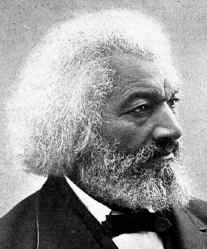Frederick Douglass (1817 - 1895)
Frederick Douglass was born the son of a slave, Harriet Bailey, and a plantation superintendent, Aaron Anthony, in February, 1818, in Tuckahoe, Maryland. Given the name Frederick Augustus Washington Bailey, he was raised by his grandparents after being separated from his mother. However, when Frederick was only six years old, his grandmother took him his master's plantation and left him there. At the age of eight, he was given the position of house boy, where he was taught to read, illegally, by Sophia Auld, the mistress of the house. In 1838, after several attempts and disguised as a sailor, Frederick escaped and fled to New York. The Underground Railroad helped Anna Murray, Frederick's love, escape. The two married and moved to Massachusetts. Frederick adopted the last name "Douglass." He soon became active in the budding abolitionist movement. A speech at the Massachusetts Anti-Slavery Society in 1841 saw the beginning of Douglass' career as a lecturer. His progressive views included being in favor of Irish Home Rule, women's suffrage, and free public education. In 1845, Douglass wrote his autobiography called Narrative of the Life of Frederick Douglass, an American Slave. Even thought it became a national bestseller, it forced Douglass into exile in England for two years to escape capture by slave traders. In 1847, Douglass returned to the United States a free man, having been "purchased" by British supporters. He began to publish an abolitionist newspaper, The North Star (later called Frederick Douglass' Paper and then The Douglass Monthly) in New York. Its motto was "Right is of no sex...Truth is of no color...God is the Father of us all, and we are all Brethen." My Bondage and My Freedom appeared in 1855. When the Civil War began in 1861, Douglass was in full support of it, advising Abraham Lincoln on two occasions. He also helped recruit African American troops for the Union army. In the 1870's, Douglass moved to Washington, D.C. and began editing a newspaper called The New National Era. The Life and Times of Frederick Douglass was published in 1881. When his wife, Anna, died in 1882, Douglass married Helen Pitts, a white woman who had been his secretary, causing a large controversy. Douglass died of heart failure in 1895. Famous quotations by Frederick Douglass:Suggested sites for Frederick Douglass:Encyclopedia article about Frederick Douglass |
|
